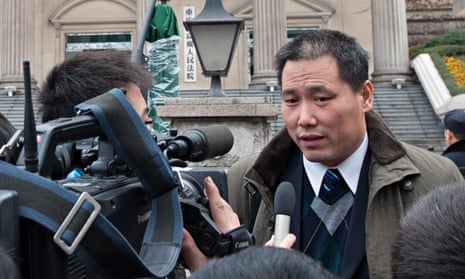China’s civil society has little cause for optimism in 2015. The country is now seeing the worst crackdown on lawyers, activists and scholars in decades.
Since Xi Jinping became China’s leader in 2012, at least 500 human rights activists and dissidents have been arrested and sentenced to prison. Rights defenders, minorities, NGOs, the internet, underground churches, universities, journalists and writers have all suffered severe controls and persecution. The authorities have taken their policy of “stability maintenance” a step further – to eliminate China’s nascent civil society altogether. Xi is seeking to destroy the people’s ability to resist by stopping the rise of activist leaders and uprooting all the nodes of civil society, which has been quietly growing for the past 10 years.
The Uighur scholar Ilham Tohti, rights lawyer Tang Jingling, activist Xu Zhiyong and many others have all been arrested or jailed.
Even so, almost no one would have thought that renowned human rights lawyer Pu Zhiqiang too would lose his freedom. He enjoyed people’s love and respect, and had found ways to bolster both his cases and his own reputation even through state-owned media outlets.
Pu has a knack for hitting the nail on the head when analysing problems, and great foresight for larger issues. He is generous in aiding friends facing difficulties. Tall, handsome, with a strong voice, he fought evil with fury and righteousness in court. In a democratic system, he would have been a charismatic leader.
Yet in the blink of an eye he became a political prisoner charged with the crimes of inciting subversion of state power, picking quarrels and provoking trouble, illegally obtaining personal information and inciting ethnic hatred.
I have known Pu for over a decade. In 2003, after successfully calling for the abolition of an unconstitutional system of detention known as custody and repatriation, I was filled with hope and decided to devote myself to the fight for human rights. Pu persuaded me to join his law firm.
Because of my activities, I was eventually expelled from the university where I worked and disbarred, “disappeared” and tortured. But Pu was never persecuted, despite his boldness.
Pu was involved with the Tiananmen pro-democracy movement in 1989, staying in the square right up until the very end, despite the obvious danger, and was one of the witnesses of the massacre. When writer Tan Zuoren was indicted for his articles on the subject, Pu tried to call former premier Li Peng and Beijing mayor Chen Xitong to give evidence. He defended Tibetan environmentalist Karma Samdrup, artist Ai Weiwei, and Tang Hui – the mother sent to a labour camp for peacefully petitioning against the sentences given to her daughter’s rapists. He played an important role in the successful campaign to abolish the notorious Reeducation Through Labor system, just one of China’s many forms of extrajudicial detention, and was one of the initiators of Charter 08, the call for democratic reforms which landed Nobel peace prizewinner Liu Xiaobo in prison.
On the highly sensitive issues of Xinjiang and Tibet, he called the government’s heavy-handed suppression in Xinjiang and Tibet a “ridiculous national policy” and amazed people by openly calling out Zhou Yongkang, the party’s former security tsar, for his abuse of power in implementing the “stability maintenance” policy. These were all extremely dangerous actions for someone to take in China, but he shrugged off my fears. Three of the four charges against Pu are based merely on around 30 posts on his microblog.
He attributed his ability to avoid persecution to his understanding of politics and his tact. He was so deeply moved by The Lives of Others, a film about the work of the secret police in East Germany, that he purchased many copies of the DVD and handed them out to secret police, hoping this would help them to retain a shred of their humanity. When they illegally put him under house arrest he still tried to calmly reason with them, knowing that to a certain degree these people who did evil things were also victims of the system.
But in the end his judgment and tact were of no avail. Under such a dictatorship, any person with a conscience who puts his or her ideals into practice must be prepared to be arrested. On 3 May 2014, Pu Zhiqiang and a dozen or so scholars held a private symposium to commemorate the 25th anniversary of the Tiananmen massacre. He was arrested shortly afterwards.
So on the one hand, we see the inherent illegitimacy of the existing regime and the abuse of civil rights that is continuously creating conflicts. But on the other there is the expansion of the internet, marketisation, and globalisation, the rise of civic awareness and social movements. The existing ideology continues to lose its appeal, the environment is worsening day by day, and the existing model of development is facing growing crises.
Despite the pressure, civil society in China is prepared to fight for its survival and growth. There will be detours, setbacks, low points and sacrifices, and more people such as Pu will pay a high price. But the motivation for this harsh crackdown is also the evidence that it will not stop China from moving towards becoming a free, democratic country.






